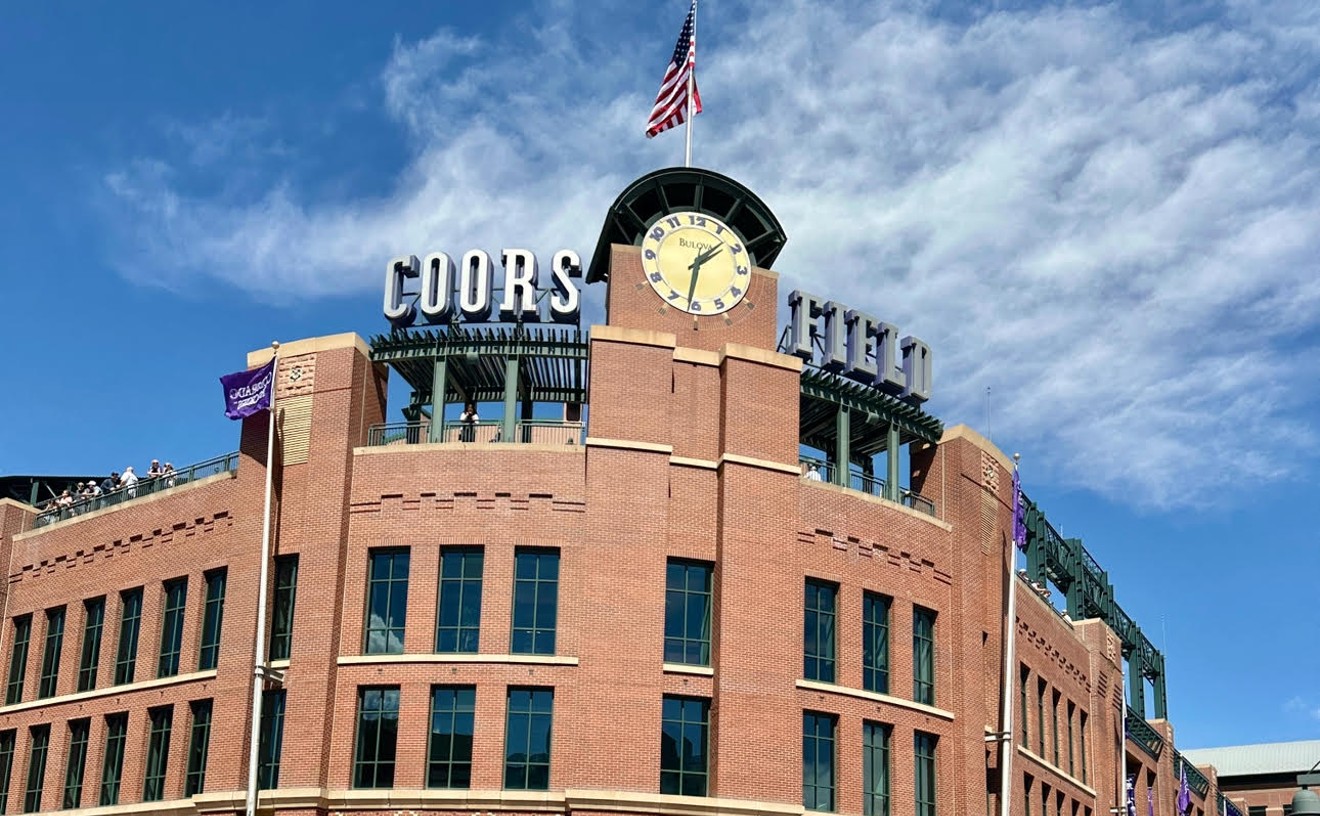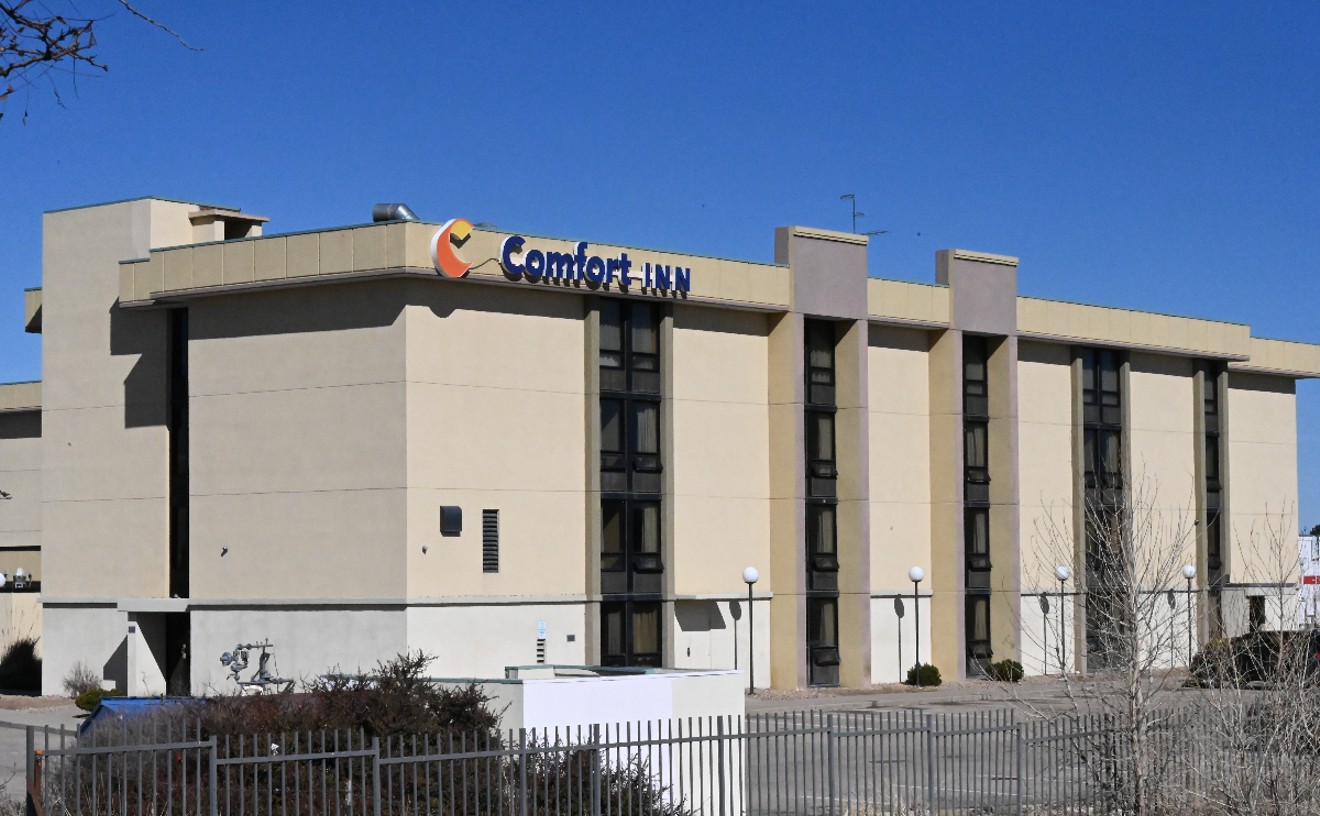The anonymous letter arrived at Heaven Dragon, a prominent Chinese restaurant in Thornton, on February 14, 2008. "To addressee only," it read, the message scrawled erratically, as if the author was trying to obscure his or her handwriting.
The "addressee" was Heaven Dragon owner Dan Tang, a man known for hosting mayors, senators, district attorneys and governors and for personally serving his Peking duck to President George W. Bush three times during his presidency.
But now, Tang was becoming known for something else.
"You and your family are targets of a large scale Federal Drug Trafficking and money laundering investigation," begins the typed letter, a copy of which was recently obtained by Westword. "You and your wife have been identified as the financial providers [of] marijuana grows in dozens of local homes. Inside sources state that you and your wife have friendly competition to see who can make the most money each month from the people below you that actually operate and maintain those grows."
The letter goes on to describe the investigation in striking detail: U.S. agents working with the Chinese government to track down drug runners transporting money across the Pacific. Wiretap operations staffed with translators fluent in Chinese dialects. One or more moles within the drug operation leaking intel to investigators. Operatives observing two of Tang's five brothers harvesting a recent indoor marijuana grow and showing off $300,000 in cash and a brand-new Porsche.
"You have a lot of money tied up in other restaurants that are not making the money you are reporting they are making," the letter warns.
There's only one option, the author says: "If you are not prepared to lose all of your money, all of your restaurants, all of your houses, all of your vehicles, and the same for your family members that are involved, including your freedom and theirs, you need to contact this number, 720-690-1518...You can, with assistance, avoid prosecution, deportation, and seizure of all your assets. The investigation will not stop, but you will be able to limit your exposure and additional evidence gathered against you. There is a lot of information that can help you and your family, if you choose to ask for it."
The most incredible thing about the letter was that nearly every word of it would turn out to be true.
When the letter reached Tang, the indoor drug ring, known to police as the "Dan Tang Drug Trafficking Organization," began to shut itself down. DEA agents and narcotics detectives with the North Metro Task Force listening in on wiretaps realized the investigation had been compromised and shifted their plan, Operation Fortune Cookie, into high gear. Two days later, on February 16, 2008, more than a hundred agents and law-enforcement officers took part in a thirty-hour-plus dragnet that, combined with follow-up raids, netted more than 24,000 marijuana plants growing in the basements of 25 suburban homes, along with $3 million in cash and more than $1 million of growing equipment ("Up in Smoke," June 25).
It was the largest indoor marijuana bust in Colorado history.
Since then, 21 people have been charged in state and federal courts in association with the marijuana ring. And Tang? He's the only one who wasn't charged with any drug-related crimes. In fact, Tang has avoided almost every pitfall the letter mentioned.
In June 2009, the U.S. Attorney's Office charged Tang with one count of money laundering in connection with the drug operation, and on September 29, more than a year and a half after the raids, Tang's lawyers filed a notice that a plea deal had been reached.
Sources close to the case say Tang will be allowed to keep Heaven Dragon and other properties in which he is a partner, such as the building that houses Heaven Star restaurant in Broomfield. In return, Tang will change his plea to guilty on November 20, and the government will keep more than $1 million in cash that was seized in the investigation. Whether he receives prison time will be determined by Chief Judge Wiley Daniel at a later hearing.
What's amazing is that thousands of pages of documents recently obtained by Westword show that law-enforcement officials believed Tang had much more involvement in the grow ring than just money laundering — and was potentially engaged in other illegal or questionable activities.
• In a February 27, 2008, interview at the DEA's Denver office, Tang said he'd been introduced to the idea of indoor marijuana grows in April 2007 by his brother, Mingyin Deng (who hasn't been charged with any crimes). Tang said his sibling had been dabbling in the pot business in Canada and Sacramento, and asked Tang if he could borrow money to set up a grow house in Thornton. The transcripts of the interview reveal that the restaurateur also admitted to police that he has "loaned large amounts of money, interest free, to numerous family members" and that "on several occasions when he has loaned money, he had suspicion that the money was being used to purchase houses or to finance in some way marijuana grow operations." Tang noted that he expressly discussed financing a pot grow when he loaned between $30,000 and $40,000 to his brother-in-law in exchange for 30 percent of the profits. He added that on numerous occasions, he'd held large amounts of cash for family members he believed came from marijuana and that he surreptitiously kept several of them on his Heaven Dragon payroll so they could show legitimate income. Gene Ciancio, Tang's lawyer, declined to comment about this and other details of the investigation.
• According to transcripts from a later interview at the U.S. Attorney's Office on April 2, 2009, Tang said his attorney "had explained to him that he had committed a crime by providing moneys to friends and family, which was used for illegal activities (marijuana grows)." He added that he received marijuana proceeds in exchange for helping relatives buy houses for pot grows and falsely keeping them on the payroll at his restaurant.
• Records indicate that the restaurateur was associated with suspicious activities years earlier. In 2002, police at Denver International Airport stopped a man reportedly heading to Sacramento and found $51,637 taped to his ankles. The suspect said he worked at Pearl Wok, a Broomfield restaurant owned by Tang's brother Fayin Deng and registered under Tang's name with the secretary of state.
• In his April 2009 interview at the U.S. Attorney's Office, Tang reported that more than $500,000 seized by DEA agents was "skimmed restaurant receipts not reported on tax returns." He explained that the money was all the $50 and $100 bills from Heaven Dragon receipts, which amounted to roughly $10,000 a month. He added that he put unreported income skimmed from Heaven Dragon into a bank account that he'd used to buy the Armadillo restaurant in Broomfield, an establishment that would later become Heaven Star.
• In response to a DEA subpoena, Thornton auditors disclosed years of Heaven Dragon sales-tax returns showing that the restaurant reported an unusual jump in sales in March 2001, with profits steadily increasing since then. A Thornton analysis showed that Heaven Dragon's average monthly gross sales for 2007 was $163,219, more than twice the average for similarly sized restaurants. Auditors also noted that in 2002, the City of Thornton found evidence that Heaven Dragon had underreported more than $500,000 in sales, for which it assessed a $38,800 penalty.
• According to a confidential informant who worked with investigators during Operation Fortune Cookie, around the time Tang talked to investigators at DEA headquarters, he also attended a meeting of grow-ring members and told them to keep quiet about his involvement in the operation. According to the source, "Tang advised whoever remained quiet about his involvement with the organization; Tang would pay for that family's attorney fees and legal expenses."
• Despite this alleged offer, several suspects went on to describe Tang as the grow ring's bankroller — or, as defendant Sheng Huang put it, "the one that gives the money to others to fund the grows." In a March 2008 interview, a suspect associated with an Eagle Butte grow house told investigators that "[Dan] Tang provides $50,000 to assist with the purchase of grow equipment and down payments on homes used to grow marijuana with an agreement that Tang receives 20 percent of profits from the marijuana sold."
• Several suspects said they worked at Tang's restaurant before they got involved in the drug business. In October 2008, a federal grand jury indicted Eric Sen with marijuana cultivation and money laundering for his role in the drug operation. Months earlier, Sen had told investigators that after emigrating from China in 2000, he'd worked in one Chinese restaurant after another until he became a wok cook at Heaven Dragon in the summer of 2007. Three months later, Sen said, Tang gave him $50,000 and arranged for a realtor so he could buy a house on South Trail Blazer Road in Fort Lupton. Sen later told Tang that he'd started a marijuana grow there; according to the law-enforcement transcripts, "Dan Tang did not seem upset by this news and even stated that it was OK for Sen to pay back the money with marijuana profits."
• Ryan Shih, a realtor with All Pro Realty of Denver who admitted to helping grow-ring members purchase eighteen houses, told investigators that he'd worked for Tang as a cook at Heaven Dragon before he decided to get his broker's license. Shih noted that his boss at All Pro had done business with Tang and that Shih may have become involved with the grow ring because Tang had referred him to a couple of people. Shih has not been charged with any crime.
• Tang's wife, Xiu Ying Li, may also have played a role in the drug operation, according to documents, although so far, she's not facing any charges. Feyin Deng and Kelly Chuong told investigators that Li "wanted her side of the family to start profiting from the sale of marijuana." Later, in May 2009, Li told DEA agents that with her husband's knowledge, she had given her brother about $30,000 from Heaven Dragon proceeds to start a grow house on East 121st Place in Thornton, because she wanted to help her brother. Tang confirmed this arrangement in his U.S. Attorney's Office interview. Authorities found 186 marijuana plants and growing equipment at this address. Li also told agents that she provided roughly $50,000 in cash to Eric Sen to help him purchase a house in which he later installed a marijuana grow.
• Numerous reports describe suspects wiring or transporting money to China while they were being investigated. A few days after the busts, a confidential informant working with investigators reported that "Tang was attempting to get illegal money out of the state and out of the country. Tang is going to employ elder [sic] relatives to transport the money via a commercial airliner to China."
• In early February 2008, the confidential informant told law enforcement that once a week, Tang's parents harvested grow houses for $150 per day. When first questioned about the drug ring, Tang denied any involvement but "admitted to knowing that his mother and father had attended to marijuana grow operations."
• A March 2009 IRS report concluded that the evidence collected during Operation Fortune Cookie showed that "in or about 2007 to April 18, 2008, Dan Khau Tang conspired to cultivate and/or distribute multi-pound quantities of marijuana in the Denver, Colorado area and other parts of the United States with several known... and unknown co-conspirators and conspired to launder the illegal proceeds by attempting to conceal bulk cash in safe deposit boxes, by using the Heavens Dragon Chinese Restaurant [sic] to falsely employ workers that were actually tending to the marijuana grows, as well as by purchasing real estate with the intent of using the property as an indoor marijuana grow." The report went on to accuse Tang of helping to purchase at least seven residences in Thornton, Henderson and Commerce City between November 2007 and February 2008 that were all converted into grow houses.
So, with all this evidence, why was Tang only charged with money laundering?
Officials with the agencies behind Operation Fortune Cookie — North Metro and DEA — referred the question to federal prosecutors, saying they can't talk about the case, at least until Tang has been sentenced.
U.S. Attorney's Office spokesman Jeff Dorschner says prosecutors didn't have enough proof to charge Tang with anything else.
"We charged with conspiracy to launder money because we have no evidence that he was directly involved with drug cultivation and distribution. He didn't go and water the plants," says Dorschner. "He took his money and used it to buy grow houses, and he received the profits back. So what we charged him with was money laundering — taking the proceeds from the crime and using it to continue funding the crime. If he didn't handle the drugs, it's difficult to charge him with a drug crime."
Other suspects in the drug ring were charged with both money laundering and drug crimes because "they had a more active role in handling the narcotics," Dorschner notes.
Sources with North Metro believe it's possible that the tip-off letter hindered the investigation into Tang. In June, Brighton Chief of Police Clint Blackhurst, who serves on North Metro's board of governors, told Westword, "It is my wish, and that of all the chiefs, that eventually the whole issue will be put to rest and the individual who was responsible for the leak is identified. I think it's a shame that this has become the focus of the investigation. All of the bad stuff, I think it's a crying shame."
The letter's vivid details led some people to suspect it came from a person close to the case. Even Tang himself told DEA agents that he "thought the letter was written by someone in law enforcement, such as a Thornton police officer," according to documents.
The DEA had similar suspicions. Soon after the raids, the agency launched a rancorous internal investigation into the North Metro Task Force, its former partner in Operation Fortune Cookie. The results of the lengthy inquiry into the leak were never released, and no one's been charged or disciplined because of it. But in the year following the bust, half of the eighteen-member Task Force left or were reassigned.
Meanwhile, parts of the grow ring apparently continued to operate. In April 2009 — more than a year after the raids — Broomfield police discovered a marijuana grow in a house owned by Tang's youngest brother. And not long after the original raids, the confidential informant told law enforcement that the southern portion of the grow ring, "that has been growing marijuana longer than the Dan Tang Organization, with more houses and more money," hadn't been uncovered before the tip-off letter set the bust in motion and was carrying on with its illegal activities.
Some of the officers involved in Operation Fortune Cookie are up in arms over the fact that the state's largest indoor weed bust might be going out with a whimper.
"I didn't risk my life for this shit," says an investigator who worked at North Metro during the investigation. "Someone who ponies up the money for marijuana grows is conspiring to cultivate and distribute. He's not immune to where his money goes because he didn't touch the drugs. The people who decided to do this should be ashamed of themselves. The only people who could be satisfied with this deal are the politicians he's connected to and the prosecution team who gave him this deal."










